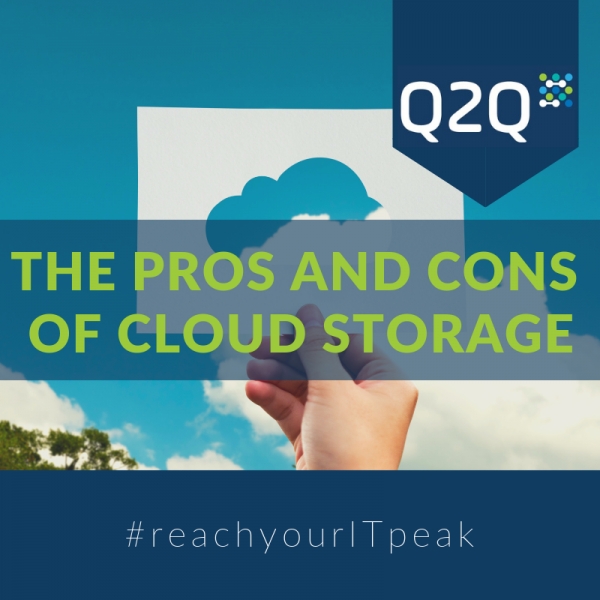Reach your IT peak: The pros and cons of cloud storage
The cloud has been a rather popular topic of conversation in the corporate world recently – with 88% of UK businesses reported to have adopted a cloud-based approach to their systems. Therefore, it’s no wonder the industry is continuing to see a spike in the amount of organisations weighing up the pros and cons of this virtual technology – but do the benefits really outnumber the drawbacks?
For SME’s looking for an answer to this burning question, you might like to read on…
Wait a second – what exactly is the cloud?
At Q2Q, we believe the world of IT should be accessible to all businesses – no matter their understanding of the digital world!
So, a fuss and jargon-free way to explain what cloud services and servers are, is an external, virtual space which firms can hire to save, store and access their company data. In turn, this removes the need for businesses to invest in and install physical hardware in their offices.
What’s so good about the cloud?
Now, there’s no denying there are many advantages of cloud-driven infrastructure, so we’ll start with just some of the reasons why it could be a great move for your business.
- Remote accessibility – One of the major plus points of the cloud is its virtual nature. It’s reachable from any location – provided there’s an internet connection – regardless of time zone or geographical status. So, for SMEs that offer flexible, remote working, or indeed for businesses with multiple sites, it’s a natural and more efficient fit.
- Space saving – With the cloud being a non-tangible concept, there’s no need for bulky hardware – such as back-up disks – in the office, just an internet connection! There is also the added benefit of reduced cabling, cooling and electrical requirements.
- Efficient back-up – All SMEs should have a data back-up plan in place, in the event of a natural disaster or power outage, for example. And cloud storage is a prime example of how companies can keep their data secure! Data is replicated and saved at a remote location, which can easily be accessed via an internet connection. As a result, business downtime is decreased, and the costs associated with traditional back-up methods are significantly reduced – it’s all very clever!
- Adapts to your business needs – Another key feature of cloud services is that they’re completely scalable – meaning you only pay for the amount of storage you use! The ‘buildable’ nature this means that if your SME experiences notable growth – calling for increased staffing and IT capacity – you can simply up your storage requirements. Naturally, if you require less, you can also shrink your quota at any time.
Sounds good, but what’s not so great?
As with everything in life, there’s a flip side, so when it comes to deliberating cloud services for your business, here are some of the potential downsides to be aware of. It’s worth bearing in mind though, the size and nature of your firm’s operations also determine the following:
- Potential downtime – Given the cloud operates via an internet connection, if your SME experiences any issues with connectivity, this will have an impact. That said, if your current connection is slow or cuts out often, this is something which should be looked into and remedied.
- Let’s talk about security – As with anything internet-based, there are risks involved when it comes to data interception and cyber-attacks. That’s not to say the cloud isn’t safe, but with information being accessible from anywhere in the world via cloud computing, if you are hacked, your data could be compromised. However, if you have a trusted and reliable service provider that looks after all this for you, this shouldn’t be an issue!It’s also important to note, the cloud can actually improve data security for smaller businesses. This is because many SMEs can’t afford the same level of protection offered by the cloud in the form of traditional hardware alternatives.
So, should your SME be getting its head in the cloud sooner rather than later? In the majority of cases, the answer is yes – it’s a cost-saving, easily assessible way of working in today’s working world. But, make sure you give it some thought, and ensure you choose a reliable provider, who will keep your virtual operations safe and secure!
If you still want to find out more about managed cloud services and how they could help your business, contact one of our friendly Q2Q team members!



